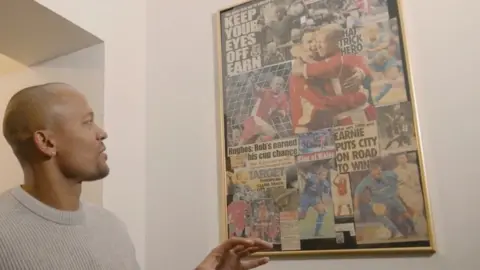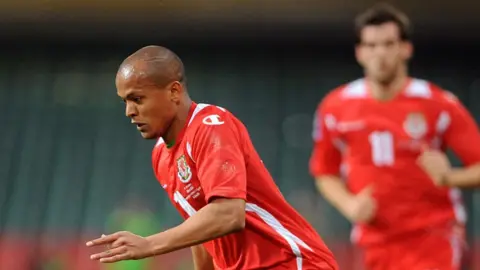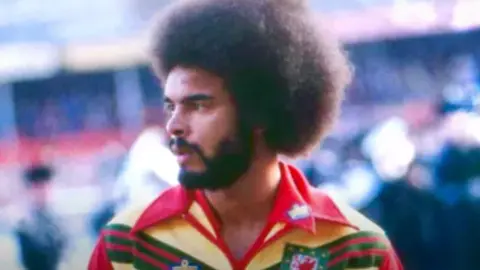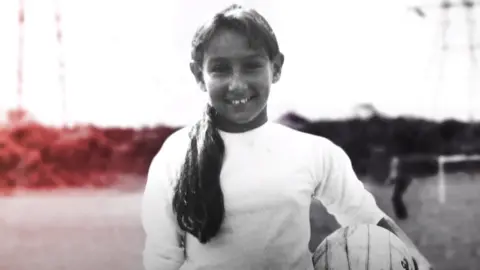Racism: We had to face it alone - ex-Wales star Rob Earnshaw
 The Dragon on My Shirt / EatSleep Media
The Dragon on My Shirt / EatSleep MediaFormer Wales footballer Rob Earnshaw has said there was no help for players receiving racist abuse during his career.
"We'd have to face racism by ourselves," said Earnshaw, who retired in 2016.
He features in a new documentary series exploring Wales' black and Asian-heritage footballers.
The Dragon on my Shirt looks back and explores the work being done to make football in the nation more inclusive.
Earnshaw, the highest scoring black player for the men's team, described the series as "eye-opening" and "powerful".
The Zambia-born 42-year-old moved to Caerphilly when he was nine.
"I was facing racism around every corner," he said of growing up in an area with just three other black people.
That racism also reared its head on the pitch after he started playing for Wales.
In 2003, Serbia's football governing body was fined for racist offences, which included abuse in a Euro 2004 qualifying match that Earnshaw played in.
 Getty Images
Getty Images"When I was playing, you're told to just play football and that's how you show them," Earnshaw said.
"We'd have to face it by ourselves... Now, I would react and challenge differently."
Now, he said there was "more support", adding: "Players will back their teammate and organisations will back their player."
The series can be seen on RedWall+, the Football Association of Wales streaming service. Series writer presenter Darren Chetty said it was another step in acknowledging Wales' diverse histories while reflecting on the challenges that remain.
"It was a fantastic experience to explore this further with people in The Dragon on My Shirt - including players that I've watched and cheered on from the terraces," he said.
One of these players was George Berry, the first black player for Wales in the post-war era.
 The Dragon on My Shirt / EatSleep Media
The Dragon on My Shirt / EatSleep Media"Going on to the pitch with the shirt on, the kit on, the crowd, was very emotional for me," he said.
He recalls some of the horrors of racism in the late 1970s and early '80s.
"It was just another battle. When they were chanting all the racial comments, it used to motivate me to play the best I could."
 The Dragon on My Shirt / EatSleep Media
The Dragon on My Shirt / EatSleep MediaWendy Reilly, the first Arab-heritage woman to play for Wales, made her debut at 16 and went on to captain and coach the team.
She said, unlike on the men's side, "I didn't get a lot of racism", adding: "We were very lucky in the women's game."
"I think it is a lot easier now, there are still a lot of barriers to break down but a lot has been done.
"They've made huge progress on and off the pitch.
"I really do think it starts on a grassroots level - it starts with the children. If we can do things like that then I believe society and sport will be a better place."
